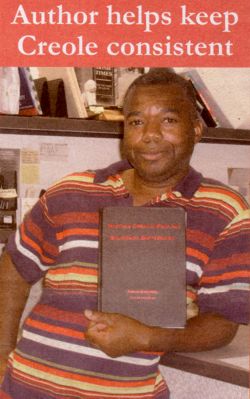| Kaz | Enfo | Ayiti | Litérati | KAPES | Kont | Fowòm | Lyannaj | Pwèm | Plan |
| Accueil | Actualité | Haïti | Bibliographie | CAPES | Contes | Forum | Liens | Poèmes | Sommaire |
“Vedrine committed to bridging language gap”
By MARTINE LOUIS
Boston Haitian Reporter
Vol. 6, Issue 9. Sept. 2007
Reporter Staff
 |
Successful language scholar Emmanuel W. Vedrine has dedicated the past 15 years to publishing a variety of books from dictionaries to essays, anthologies… that address numerous aspects of the Haitian culture. An experienced translator and successful teacher, Vedrine has committed himself, in particular, to giving Haitians and non-Haitians alike better access to the Creole language.
While teaching in Massachusetts, Vedrine discovered that many of his Haitian students were falling behind academically and noted that learning material in their native language would improve the quality of their education. In 1992, he published his first Dictionary of Haitian Creole Verbs with phrases and idioms. “I wanted to do something that combined my experiences as a translator and as a teacher to help the Haitian community”, said Vedrine. “The ability to speak another language other than your native tongue not only allows you more opportunities, but you are also able to communicate with millions of people. You can better enjoy a culture when you can express yourself in its language.” |
With publications such as Materyèl edikatif pou bileng ayisyen and Yon koudèy sou pwoblèm lekòl Ayiti… which offer essays, short stories, and discussions on the lack of adequate education in Haiti, Vedrine also hopes to make an impact on the older generation of the Haitian community.
“We come from a time that has taught us to hate ourselves and what we own. We have been taught to leave our country behind and move on to a ‘better’ place. This is why Haiti is consistently suffering crisis after crisis. We need a ‘new school.’ One that will teach us to be proud of our roots,” said Vedrine.
“Then there are Haitians that are too proud to learn another language. They make it an issue of double-nationality. But it is not a matter of trading your native roots for the American system,” he says. “It is about further educating yourself. There are Haitians who feel they are too old and it is too late, but the energy to make a difference is already within us. The problem is we do not use it.”
Vedrine believes educating parents is essential to raising good leaders because what they know they will pass it down to their children. In order to prepare a positive young generation to take over. Vedrine says they must first learn all aspects of their own heritage.
“Parents need to work harder at being role models for their children. Our generations are disconnected and we need to learn how to unite,” he advises. “From each other is where we draw our strength. That is what I hope to teach society with my work. That language builds that bridge connecting generations and connecting cultures.”
In Vedrine’s latest book, A healing paradigm for a new Haiti, he introduces his campaign to improve the school system and curriculum in Haiti. “I want to promote the importance of Fridays as a day for ‘practical education,” Vedrine explains. “A day to educate students outside of books and beyond the classroom. Offer them hands on learning experiences, tools they can use and they can give back to the country.”
Vedrine says his own struggle with transitioning from one culture to another after he left Haiti in 1976 motivated him to continue with his work. “When I got here it was such a culture shock… I was unable to communicate. In order to be more involved in society I had to overcome those obstacles. I taught myself English, and then I learned Spanish.”
“The difference in how people interacted with me then was unbelievable,” says Vedrine. “I wanted to do the same for others facing similar difficulties. When I first began working and writing, I was told that there was no market in Creole. I was asked ‘why do it if no one was going to read it?’
“Surprisingly those comments came mostly from the Haitian community. But my work has never been about marketing. I want to do something to help Haiti – money does not come first. Knowing that thousands benefit from my work makes me happy. Forget about the market, I just want to do something that will change lives.” …
![]()
